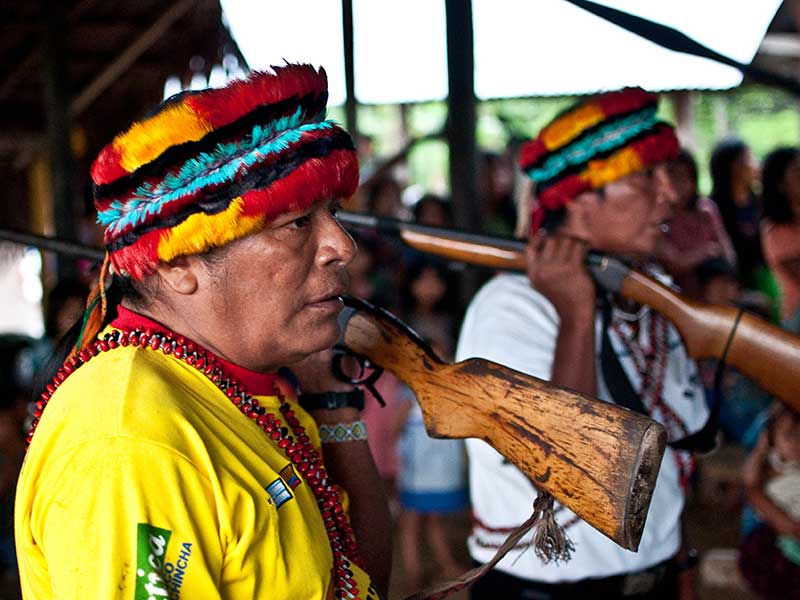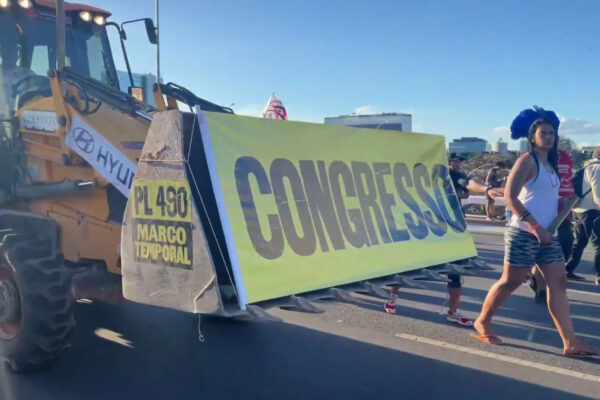
Peru’s government and its Congress appear to be at loggerheads over control of Block 192, the country’s main onshore source of crude. At the end of August, having contracted a Canadian company at the last moment, Pacific Stratus Energy, the government now has to decide what to do after Congress voted overwhelmingly to authorize Petroperú to exploit the concession. Indigenous peoples of the north-eastern jungle are indignant at the government turning its back on dialogue about the future of Block 192. The issue throws into question the government’s whole approach to prior consultation. Here we provide our readers with a detailed background to this long-running dispute between indigenous peoples, government and foreign investors.
A bit of history
For forty years since the discovery of oil in 1970, the indigenous peoples along the rivers Pastaza, Corrientes, Tigre and Marañon within the Block 1AB (since renamed 192) oil concession suffered the health, environmental and social impacts of oil drilling. In 2006, an uprising in the Corrientes river basin obliged the government and the Argentine Pluspetrol oil company, which had inherited the concession from Occidental Petroleum, to negotiate an agreement to address some of these impacts. The example of what the Corrientes River Indigenous Federation (FECONACO) had achieved subsequently inspired the remaining federations in the area to begin a campaign to have their needs addressed.
The announcement of the expiry of Pluspetrol’s oil concession at the end of August 2015 led to a promise that any new or renewed contract would involve prior consultation with the representatives of the indigenous peoples affected. The four indigenous federations involved then said they would only participate in prior consultation once the government had addressed a number of pressing issues arising from water contamination, primarily environmental remediation, health problems, land titling, compensation for the use of indigenous territories, and indemnity for damages. Thus began a long and complex negotiation that ended with an historic agreement on 15 March this year, with prior consultation getting under way on 13 April.
One delay after another
The conditions for prior consultation were far from ideal, given disagreements between the federations themselves (the Tigre federation (FECONAT) had previously broken with the other three) and distrust between government and indigenous negotiators. The first dialogue meetings, scheduled for 29 April to 4 May, had to be suspended on 1 May because Perupetro (the state-owned company responsible for promoting investment in exploration and exploitation of hydrocarbons and negotiating, signing and supervising contracts), had been unable to bring all the indigenous delegates to the meeting and failed to provide the necessary documentary information. New meetings were scheduled for 17-20 May, the responsibility for organizing them shifting from Perupetro to the environmental affairs division of the Ministry of Energy and Mines (MEM). Meetings in Iquitos on 19-23 May concluded that divisions within the indigenous federation would mean that separate consultations would have to take place: 14-17 July with FEDIQUEP (from the Pastaza valley) and FECONACO and 20-22 July with FECONAT.
Meanwhile Perupetro called for bids for Block 192 on 14 May with a decision expected by 15 July. On 26 June, Repsol, Perenco and Pluspetrol announced that they would bid for Block 192.
By 2 July the information stage of the consultation process ended after workshops involving 400 participants had been held. In preparation for the full consultation meetings scheduled for 14-17 July, FEDIQUEP and FECONACO held their own consultation meetings with their member communities; a list of 27 issues to be discussed was agreed.
On 13 July Perenco, Pluspetrol and Pacific Stratus (which had replaced Repsol in the bidding process) asked for a postponement in the date for presenting their bids.
Two days later, the consultation meetings with FEDIQUEP and FECONACO were suspended and then postponed till 23 July, since a newly-formed breakaway federation, ORIAP (also from the Pastaza valley), demanded to be included. Moreover, the government had still not defined its position regarding the 27 issues, especially the proposal for the establishment of an endowment fund of 1 billion soles (around 310 million dollars) for social development. The government then decided to include ORIAP in its negotiating sessions with FECONAT. On 23 July the government requested yet another postponement in the talks until 14 August. The chairman of the board of Perupetro, Luis Ortega, had meanwhile resigned. He was replaced by Rafael Zoeger, who had worked with a Pacific Stratus affiliated company until March.
No bids and “Plan B”
On August 4, when no company had presented a bid for Block 192, the government had to cancel the bidding process and announce that it would need to develop a “Plan B”. It would have to decide between holding direct negotiations with one or more oil companies for the 30 years concession; allocating the block to Petroperú, (the state oil company for the transportation, refining and commercialization of hydrocarbons); or negotiating a two-year service contract until such time that a new bidding process for the 30 years concession could be organised. On 14 August, Perenco announced that it was withdrawing from the bid.
On 14 August, the MEM held meetings in Lima with all four federations (FEDIQUEP, FECONACO, FECONAT and ORIAP). It announced that it was unilaterally ending the consultation process on the basis of what it had negotiated with FECONAT and ORIAP, and it gave all four federations one hour to consider its ‘first and final offer’ to create an endowment fund financed from 0.75% of the value of production from Block 192. FECONAT and ORIAP signed the agreement offered, whereas FEDIQUEP and FECONACO stood out for 2% and refused to sign. The government then abruptly and unilaterally ended the consultation process in an evident show of bad faith in order to devote its energies to resolving the crisis over the renewal of the concession for Block 192.
With the existing contract expiring on 29 August, the government concentrated its efforts on trying to negotiate a two-year service contract with Pluspetrol, Pacific Stratus and a new participant, Omega. The problem with Pluspetrol was its unpopularity (not least among indigenous groups in Block 192) while Omega appeared to lack the necessary resources. So the negotiations centered on reaching a deal with Pacific Stratus.
Meanwhile the government’s environmental watchdog, OEFA, obtained a court order to oblige Pluspetrol to respect its environmental obligations in closing its concession and, with support from the governor, the Loreto regional government launched a campaign to have Block 192 assigned to Petroperú. On 23 August the dialogue with the government was suspended and a 24-hour strike, organized by the Frente Patriótico, a regionalist pressure group, paralysed the region the following day.
Petroperú versus Pacific Stratus
In Lima, Congress then intervened when 15 members presented a motion for Block 192 to be assigned to Petroperú. On 27 August, the Prime Minister and Minister for Energy and Mines, with support from the Fujimorista party, managed to persuade Congress to defer the motion to the Commission for Energy and Mines in the legislature, arguing that Petroperú had been offered the opportunity to participate in the concession with a 25% share but had refused. They also argued that Petroperú lacked the capacity and financial resources to take on the concession and that Petroperú was anyway prohibited by Law 30130 from undertaking any financial commitment which would place in jeopardy its capacity to repay the 3.5 billion dollars borrowed to modernise the Talara refinery in Piura. The following day the government signed a contract with Pacific Stratus to manage the concession for two years under a service contact and, on 29 August, it published a decree (DS No. 027-2015-EM) authorising the contract.
The government clearly underestimated its declining popularity and the consequences of the loss of its majority in Congress. The Frente in Loreto announced a 48-hour strike for 2-3 September in protest against the contract, demanding that the concession be assigned to Petroperú. FEDIQUEP and FECONACO announced that they were not aligned with any oil company (public or private) and wrote to President Ollanta Humala requesting that the consultation be continued to enable the pending issues to be resolved. For their part, FECONAT and ORIAP supported the Frente and the regional government and proceeded to occupy some of the oil installations. The Minister for Energy and Mines failed to attend a meeting of the Energy and Mines Commission with representatives from FEDIQUEP and FECONACO which it had been hoped would lead to the continuation of the consultation.
Congressional about-turn
On 3 September, amid the protests and regional strike in Loreto, the Congress in Lima reversed its position; an overwhelming vote, including members of Keiko Fujimori’s Popular Front (FP) party and many prominent members of Humala’s own party, removed the legal obstacles to Petroperú’s participation in the Block 192 concession. However, as the President of the Congress Luis Iberico pointed out, this enabled, but did not oblige, Petroperú to undertake the concession, thus paving the way for the government to reopen negotiations with Pacific Stratus to allow for a 25% participation by Petroperú or to allow Petroperú to make the necessary preparations to assume responsibility for the concession in 2017, a matter to be decided by the government elected next year.
Humala has constitutional powers to veto the law, but the strength of congressional support for the law suggests that a vote to overrule the veto would probably be successful. Representatives of the business community, led by Confiep (the business sector lobby organization), decried what they considered to be congressional ‘populism’, claiming that international investor confidence would be undermined.
Future of consultation?
The unilateral conclusion to the prior consultation process represents a serious blow to the possibility of carrying out future consultations successfully. The frequent postponements reflected the government’s limited capacity to agree internally on its negotiating positions and then argue these effectively. The promotion of new participants in the consultations, the separate but parallel consultations with supposed ‘allies’ and ‘opponents’ and the government’s final ‘take-it-or-leave-it’ smacked of government manipulation and bad faith.
The national Amazonian indigenous federation, AIDESEP, has come out in support of FEDIQUEP and FECONACO in their accusations of arbitrariness and bad faith, echoing the federations’ expressions of indignation and frustration. The Ombudsman’s Office (Defensoría del Pueblo) has called on the government to persist with negotiations, as have the National Human Rights Coordinator, Amnesty International, numerous civil society organizations, and a long list of national and international academics and intellectuals.
It remains to be seen whether the government will heed their calls to return to the table to conclude the consultation with an agreement involving all parties, or rather insist on imposing its own will with the risk of undermining the credibility and legitimacy of the whole prior consultation process. To do so would generate further resentment and likely future conflicts with Amazonian indigenous peoples.













